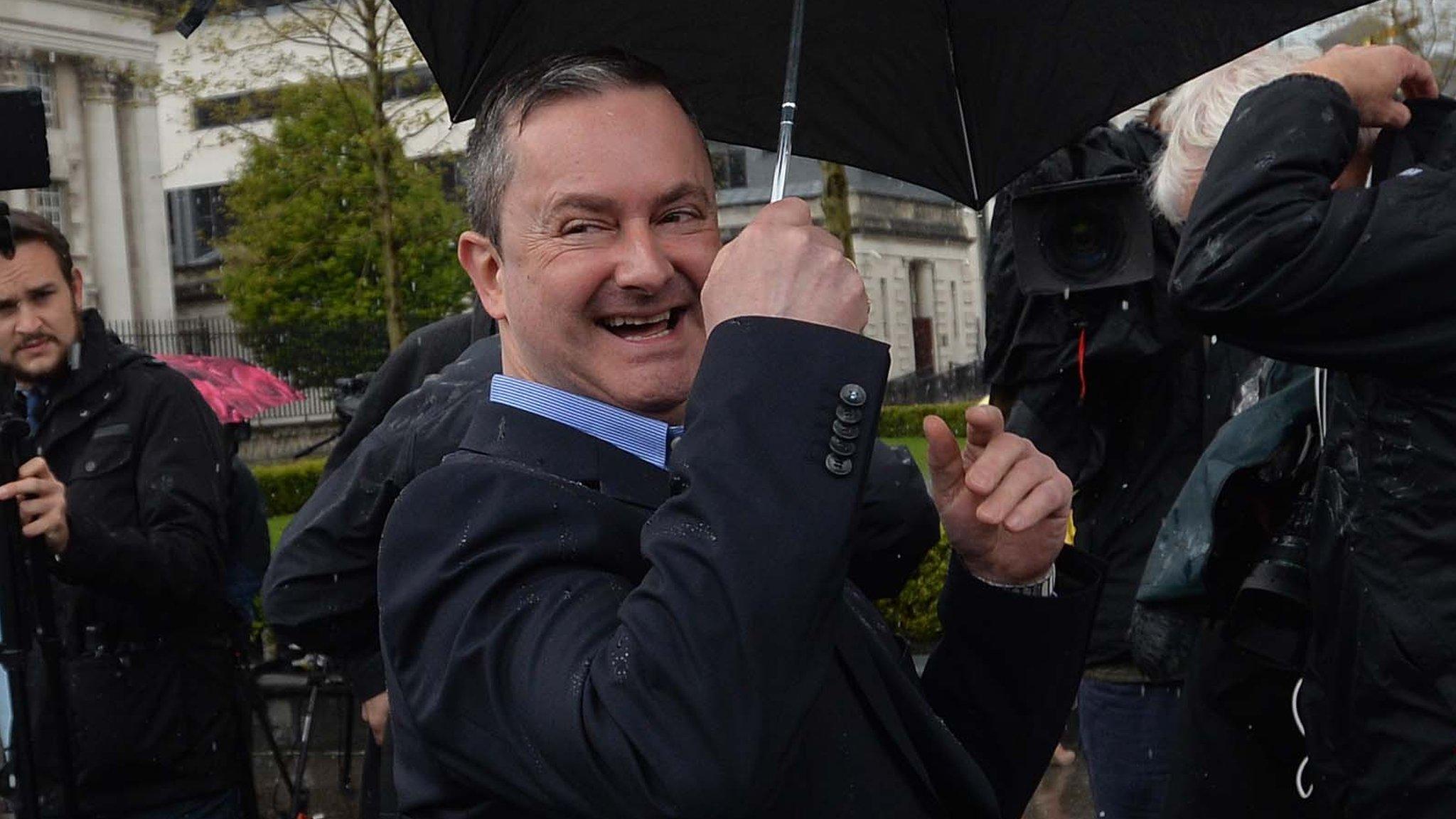'Gay cake' row: What is the dispute about?
- Published
The European Court of Human Rights has dismissed a legal challenge in a long-running dispute known as the "gay cake" case, ruling the action inadmissible.
The ECHR is the latest court to have its say in the long-running controversy.
It all started in 2014, when a bakery in Northern Ireland refused to make a cake with a slogan supporting same-sex marriage.
Here's a look at how the case reached Strasbourg:

What about the bakery?
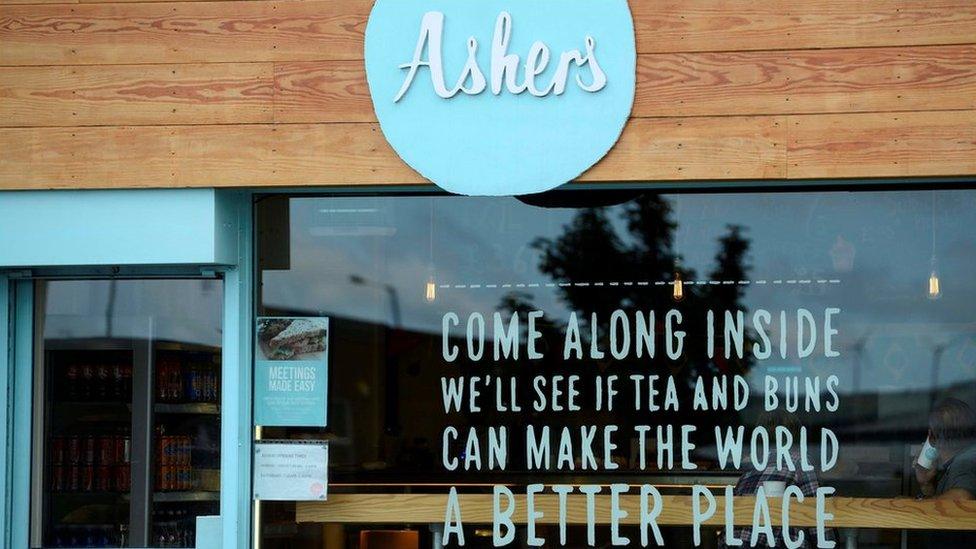
Ashers is a Christian-owned bakery
Ashers Baking Company was founded in Newtownabbey in 1992.
Run by the McArthur family, the Christian-owned business operates several shops in Northern Ireland.
The bakery came to wider prominence in July 2014 when it emerged that it had declined an order in its Belfast branch from gay rights activist Gareth Lee.
He had wanted them to make a cake that included a slogan that said "support gay marriage" along with a picture of Bert and Ernie from Sesame Street, and the logo of the Queerspace organisation.
At the time, same-sex marriage was still illegal in Northern Ireland, but the law has since changed and same-sex weddings have been taking place since February 2020.
The cake was being commissioned for a civic event in Bangor, County Down, to mark International Day Against Homophobia and Transphobia.
Staff at the bakery passed the order to its head office, which considered it to be "at odds" with their beliefs.
Another bakery agreed to accept the order.

What happened after that?
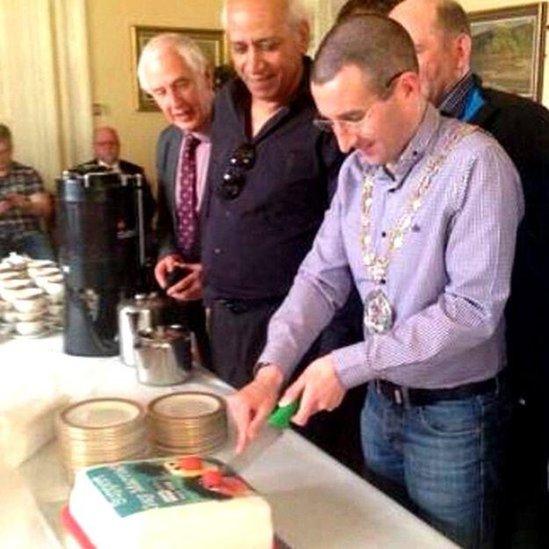
Councillor Andrew Muir cuts the replacement cake that was made by another bakery

The customer who placed the order with Ashers complained to Northern Ireland's Equality Commission, and the watchdog took up the case, warning the company it had allegedly discriminated against the man on the grounds of his sexual orientation.
The Equality Commission said it raised "issues of public importance regarding the extent to which suppliers of goods and services can refuse service on grounds of sexual orientation, religious belief and/or political opinion".
The commission supported Mr Lee in taking his legal case alleging discrimination.
However, Ashers said it was taking a stand on the grounds of religious freedom.
The bakery's stance was backed by the Christian Institute, which provided legal assistance.

The political reaction
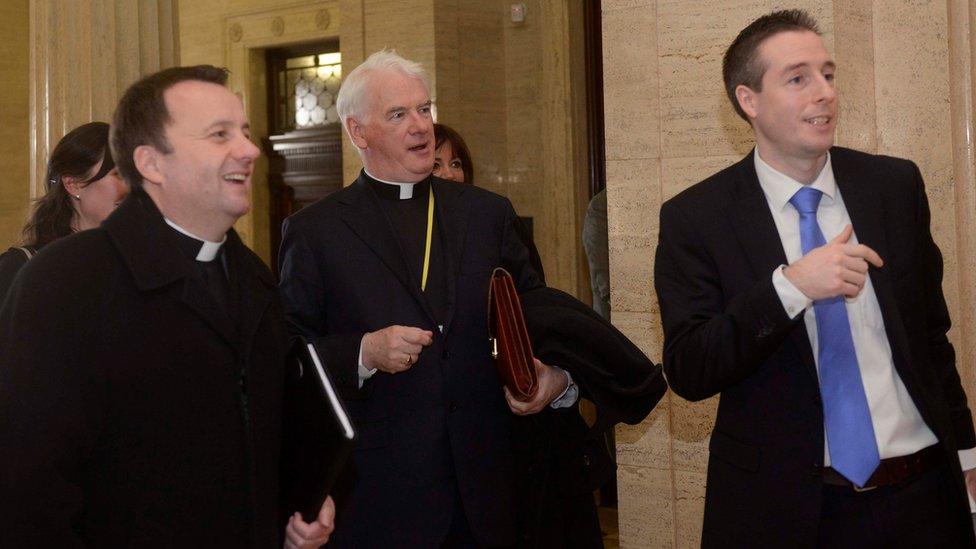
A Catholic delegation met DUP assembly member Paul Givan (right)
The Democratic Unionist Party (DUP), led at the time by Northern Ireland First Minister Peter Robinson, led the opposition at the NI Assembly to the Equality Commission's case.
DUP assembly member Paul Givan (now first minister) drafted a Private Member's Bill seeking to build a conscience clause into equality law in Northern Ireland.
This clause would allow businesses to refuse to provide some services if they clashed with their strongly-held religious convictions.
Mr Givan said: "Christians do not feel there is space being made for their religious beliefs."
The Catholic Church said it supported the general objective of the DUP's move.
However, opponents of the bill, led by Sinn Féin, pledged to block the clause and therefore it never reached the stage of a vote.

What about the public reaction?
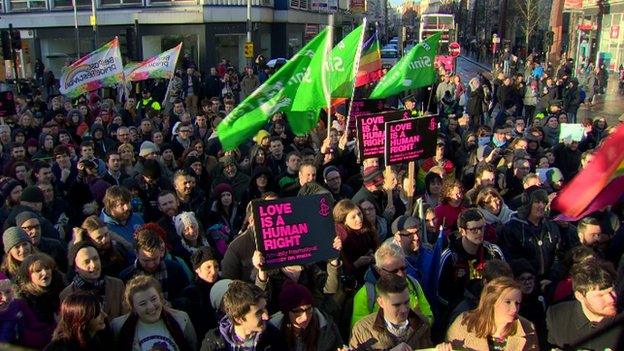
Thousands of people attended a rally in protest over the DUP's conscience clause bill
Rival demonstrations were held in support of both sides in the case.
In January 2015, thousands of people gathered at Belfast City Hall to protest over the DUP's conscience clause bill.
The crowd was addressed by politicians from Alliance, Sinn Féin and SDLP, as well as community leaders.
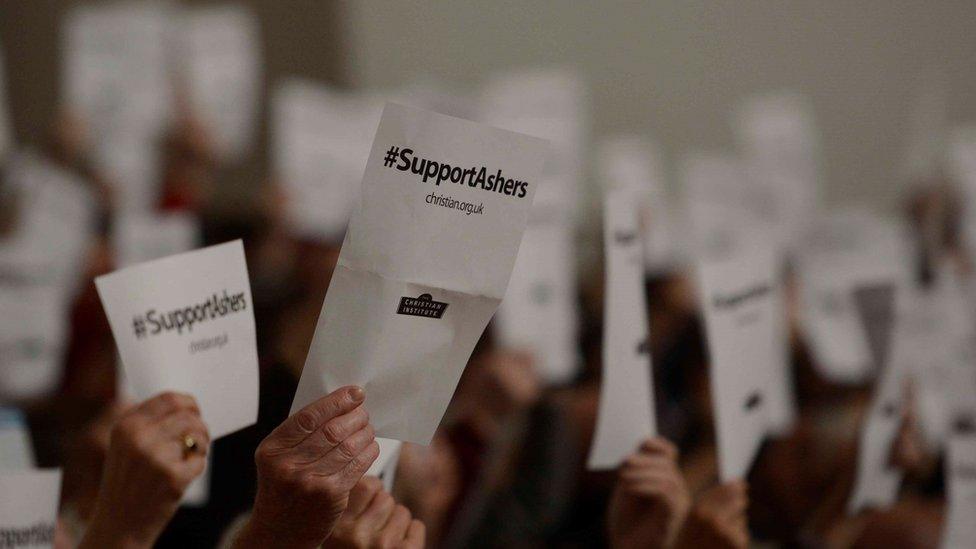
A demonstration in support of the bakery's stance was staged at Belfast's Waterfront Hall
Two days before the court hearing in Belfast in 2015, more than 2,000 people gathered at the city's Waterfront Hall venue to show their support for Ashers.
Hundreds more supporters stood outside the venue and sang hymns.
What happened in court?
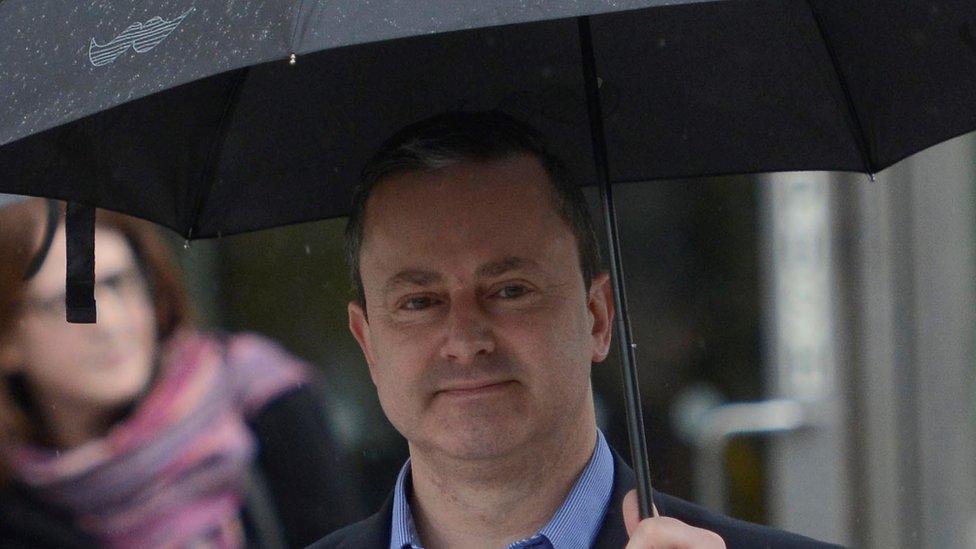
Gareth Lee, who placed the cake order with Ashers, said the refusal made him feel "unworthy"
The court case in Belfast ran for three days in March 2015.
During the hearings, a lawyer for the bakery argued the issue was "the cake, not the customer".
One of the bakers, Karen McArthur, said she did not know Mr Lee was gay and it would not have mattered as they would not have been prepared to make a cake with a pro-same-sex marriage slogan for anyone.
However, Mr Lee said he felt he was discriminated against.
He said that after ordering the cake and paying for it, only to be told two days later that his order had been rejected: "It made me feel unworthy, a lesser person."
While the debate leading up to the hearing had been often heated, the BBC's Mark Simpson found that in the courtroom it was a different story, and there was "no heckling, shouting or jeering".
"There was respect between the legal teams, politeness from the witnesses and a respectful atmosphere inside the courtroom, including the packed public gallery," he said.

What did the court decide?
Daniel McArthur, manager of Ashers Bakery, said they were "extremely disappointed with the judgment"
The judge found in favour of Mr Lee, external, saying that as a business, Ashers was not exempt from discrimination law.
District Judge Isobel Brownlie said Ashers was "conducting a business for profit" and it was not a religious group.
The firm was found to have discriminated against Mr Lee on the grounds of sexual orientation as well as his political beliefs.
The judge said she accepted Ashers had "genuine and deeply held" religious views, but said the business was not above the law.
Damages of £500 were agreed in advance by legal teams on both sides of the dispute.
Robin Allen QC said his client Gareth Lee was "very glad" the case was finished

Did the owners appeal?
In October 2016, the owners of the bakery lost their appeal against the ruling that their refusal to make a "gay cake" was discriminatory.
Appeal court judges said that, under law, the bakers were not allowed to provide a service only to people who agreed with their religious beliefs, external.
Reacting to the ruling, Daniel McArthur from Ashers said he was "extremely disappointed" adding that it undermined "democratic freedom, religious freedom and free speech".
The firm then took the case to the Supreme Court and they won.
The UK's highest court ruled the bakery's refusal to make a cake with a slogan supporting same-sex marriage was not discriminatory.
Then president of the Supreme Court, Lady Hale, ruled the bakers did not refuse to fulfil the order because of the customer's sexual orientation.
"They would have refused to make such a cake for any customer, irrespective of their sexual orientation," she said.
"Their objection was to the message on the cake, not to the personal characteristics of Mr Lee."
And from there, Mr Lee took his case to Europe, arguing the UK Supreme Court "failed to give appropriate weight" to his case under the European Convention of Human Rights.
Related topics
- Published19 May 2015
